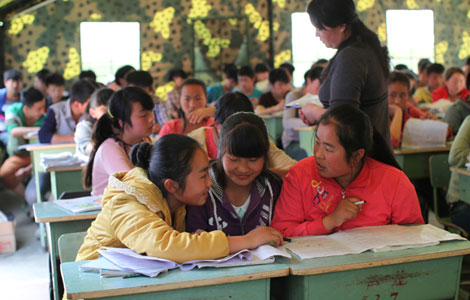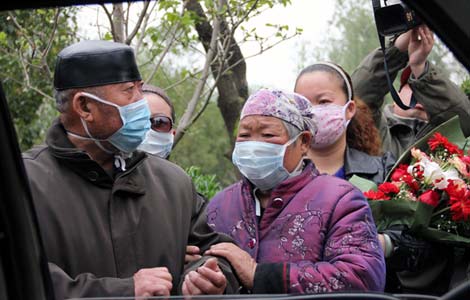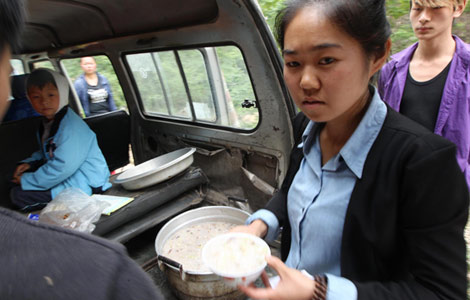Water remains unfit to drink
Updated: 2013-04-25 08:12
By Zhao Lei in Lushan, Sichuan and Yang Yao in Beijing (China Daily)
|
||||||||
Water safety remains a problem in the earthquake-hit areas of Sichuan province, rescuers said on Wednesday.
Zhou Yun, with Mianyang city's disease control and prevention center, sampled 15 sites from mountain springs, rivers, wells and water treatment plants in six villages in Longmen township, Lushan county.
Analyzed in a laboratory set up in a tent, the water was found to be slightly turbid, organically contaminated and unsuitable for drinking.
"But it can be used for washing clothes and showering," Zhou said. Bacterial tests results have yet to be released.
"Now we need to inform the villagers not to drink water directly from mountain springs, rivers or wells," he said.
They also taught villagers simple water treatment measures. "By putting two potable water purification tablets in 15 liters of water and boiling it, people can drink the water," Zhou said.
Now residents rely largely on bottled water. However, this is not a permanent solution, he said.
A teacher who did not want to be identified told China Daily that clean potable water storage can only last for a day. "The water supply pipes have not reached our town," he said.
Zhou and other health personnel said that they have a lot of work to do as local people do not have much knowledge about water safety.
In Lushan, where a major shelter has been built near a stadium, residents tried to pump water out of the swimming pool for daily use.
Zhu Xiaoping, an expert with the Sichuan CDC, said that the bacteria in the water from the pool exceeded standards.
"We have put up a sign there and warned residents not to drink from it," Zhu said.
Zhu said the next thing they will do is investigate water sources. "But that would need government support from forestry, agriculture and water authorities," Zhou said.
To ensure villagers' health, fecal bacteria should also be prevented from polluting the water. However, as villagers have all moved to shelters, a lack of toilets has become a problem.
Outdoor latrine pits cannot be flushed, as running water has not been restored. "This could trigger public health risks," said Zhang Biao, a doctor with the Chengdu air force medical team.
Now they spray the pits with quicklime to disinfect them, and 337 makeshift toilets will be built in the disaster area to ease hygiene problems, said Zhang Chengwen from the Red Cross Society of China's Yunnan office.
(China Daily 04/25/2013 page5)
Most Viewed
Editor's Picks

|

|

|

|

|

|
Today's Top News
Sluggish growth takes its toll on foreign lenders
Investors find a home in overseas real estate
More Chinese travel overseas, study reveals
Xi meets former US heavyweights
Li in plea to quake rescuers
Canada to return illegal assets
Beijing vows to ease Korean tensions
Order restored after deadly terrorist ambush
US Weekly

|

|














